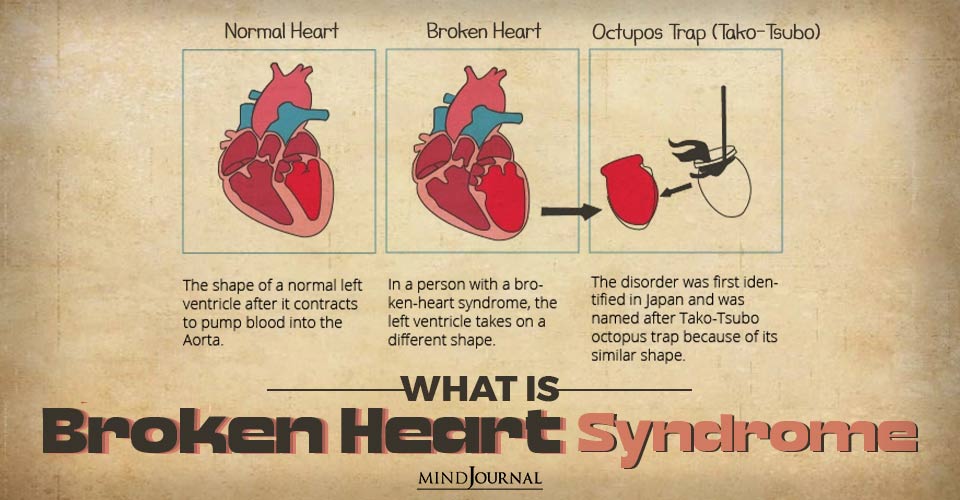Broken Heart Syndrome is one of those things that people consider to be folklore, but the truth is, it isn’t. Broken Heart Syndrome is a sad reality, and many people suffer from this. A condition that affects the heart’s muscle tissue and the initial symptoms of this syndrome are similar to those of a heart attack
Valentine’s Day is not always a candy-coated day of love and romance. For many who’ve lost a loved one, suffered a breakup, or are on the brink of separation or divorce, this day is anything but sweet.
The emotional and physical challenges may result in Takotsubo Cardiomyopathy, more casually known as Broken Heart Syndrome.
Learning about Broken Heart Syndrome can help you heal from the pain and trauma of love and loss – and make it through emotional calendar events like this.
Facts About Broken Heart Syndrome
- Profound emotional sadness doesn’t just weigh heavy on your mind. It significantly impacts your body.
- The depths of being heartbroken lowers your immune system, increases blood pressure and heart rate, and causes significant muscle weakness, just to name a few.
- Stress from heartbreak grief can flood the body with hormones, specifically cortisol, which causes that heavy-achy-feeling you get in your chest area.
- The heartache that comes from lost love can increase the likelihood of a heart attack. In fact, a recent study showed that a person who has a tendency to be depressed and has recently suffered a love trauma was five times more likely to die than a person with depression alone or a heart condition alone.
- Women are 10 times more likely to suffer from Broken Heart Syndrome than men.

Related: How A Strong Woman Heals Her Broken Heart Differently
Tips for Preventing Broken Heart Syndrome
1. Take control.
Prepare yourself for the holiday crush that comes from television, radio, online, and print. Limit your exposure to such things if the overblown seasonal attention becomes too much.
2. Take stock.
In knowing that you’re not alone in feeling lonely, let down, or unhappy during this time. Many are quietly suffering through just like you.
3. Don’t hold in your emotional pain.
Studies show that expressing emotions greatly reduces the body’s stress response.
4. Don’t put a time limit on your grief.
And don’t let others set one for you either. Your healing time for this love trauma is uniquely yours.
5. Make sure you tend to your physical needs.
Softness, warmth, and touch can be healing. Feed your other senses too — music, scents, and beauty. Don’t forget to taste the world.
6. Don’t ignore chronic aches or pains.
Check-in with your physician to make sure that you’re in good medical health.
7. Make sure you eat well.
Choosing healthy foods to keep you nourished during difficult times.
8. Keep a routine sleep schedule.
If you require medication to help you with sleeping, to regulate moods, or for cardiac management, don’t feel ashamed. You’re going through a significantly stressful time.
9. A broken heart leaves many people feeling stunned and stuck.
Move. Get out of bed. Take a shower. Go for a walk. Feel the sun on your face.
10. If you feel fragile, limit your exposure to emotionally driven holiday events.
That doesn’t mean you should avoid people completely. Decide what social connections will give you support, and which ones may be too taxing.
11. Don’t forget your spiritual side.
Prayer, even meditation, has been shown to comfort a broken heart.
Above all, remember: A broken heart doesn’t make you’re unlovable. At this moment in time, you are healing. But remind yourself to be open when love presents itself again.
References:
Behrens, C.B . et. al. (2010). Major depression as a potential trigger for Takitsubo Cardiomyopathy. International Journal of Cardiology, 15;140(2):40-42. Bybee, K.A. & Prasaad, A. (2008). Stress related cardiomyopathy syndromes. Circulation: Journal of the American Heart Association,118:397-409.
Written By Deborah Serani Originally Appeared In Psychology Today
Broken Heart Syndrome can be difficult to deal with, but not impossible. No matter how hard it may seem, there is light at the end of the tunnel. No matter how much pain you feel inside, it will get better with time.
Frequently Asked Questions:
What is broken heart syndrome?
Also known as takotsubo cardiomyopathy or stress cardiomyopathy, broken heart syndrome is a short-term and transient heart condition typically caused by intense emotions, stressful or negative life events, and physical illness or surgery. It is marked by a dysfunction in the left ventricle of the heart.
What are the symptoms of broken heart syndrome?
Is broken heart syndrome different from panic attacks?
Broken heart syndrome is not similar to a panic attack. Although panic attacks may involve similar symptoms as a reaction to perceived stress, it does not physically harm the heart muscle. In broken heart syndrome transient, regional systolic dysfunction of the left ventricle of the heart occurs.
Can you die from broken heart syndrome?
In short, yes. But death is highly unlikely. Although mortality ranges from 0 to 10% for broken heart syndrome, death is extremely rare as early diagnosis and effective treatment can lead to a full recovery within a few weeks.
What is the treatment for broken heart syndrome?
Treatment of this condition primarily depends on the intensity of the symptoms. Common treatment approaches may involve medications, cardiac rehabilitation, and stress management techniques like meditation and yoga. Coronary angiography may be recommended by a doctor.











Leave a Reply